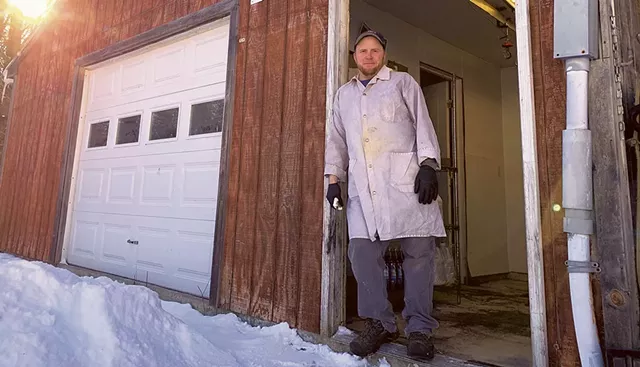Every May, I drive from my home in Thetford Center to the Jellison Farm in Bath, N.H., to pick up the three piglets my family will raise through the summer and fall. Just 8 weeks old, they weigh about 25 pounds and are small enough to fit in a dog crate in the back of my pickup truck. Once I’ve settled them into their new home in the pasture behind the barn, I give Brent Kidder a call.
Kidder, 41, owns Kidder’s Smoke & Cure, a custom-exempt processor in Orange, about six miles southeast of Barre. Unlike commercial processors, who are licensed to cut meat that may be sold at grocery stores, farmers markets or restaurants, Kidder cannot sell the meat he cuts.
Like all of Vermont’s 35 or so custom-exempt processors, Kidder is licensed to butcher meat only for the personal use of those who raised or hunted the animal, or for those who have bought live animals from farmers under a state law that permits the sale of a limited number direct to consumers.
Over the 12 years since Kidder took the reins of the family business, it has grown to five employees, with whom he processes as many as 300 deer and 1,000 domesticated animals annually. He also smokes meat for his customers and for more than a dozen fellow custom-exempt processors who bring him their customers’ fresh hams and bacon, for a total of at least 25,000 pounds a year.
That may all seem to add up to a full-time gig, but Kidder also holds down a 40-hour-a-week job at a Barre granite shed. I know if I want to get on his list for a fall slot, I’d better call early.
In late October or early November, after our pigs have hit about 200 pounds each, I pay Mark Durkee, an itinerant slaughterer, to come to our pasture. Then we load the carcasses into my truck.
Kidder always meets me at the door of his shop, where he will later wield handsaws and boning knives to break down the animals into cuts such as hams, pork chops and ground sausage. I like his breakfast sausage best, but my wife prefers the sweet Italian, so we get half of each.
Not only does the meat taste great, but we also have the extra satisfaction of knowing exactly how our food was raised.
For Seven Days, I chatted with Kidder about how he juggles the workload, his most unusual processing job and the future of his family business.
You have a full-time job, so why take on this whole other business, and how do you manage both?
I work an eight-hour, nine-hour day at the granite shed and usually get here about 2:30 p.m. and work until 11 at night. It’s really not a moneymaking job, [though] it does help with our everyday bills. It’s more [about] helping the local farmer, the local Vermonter not having to pay a lot of money to go to the grocery store to get commercially grown animals. We definitely like the local farmer that raises pigs to feed his family and maybe gives a few things to his neighbors.
What’s the most unusual animal you’ve ever processed?
It was [for] a lady who had [an emu] as a pet and it was not doing so well. We went over and helped her dispatch it, and then she’s like, “Oh, we can’t waste it; we’re gonna eat it.” We made it into smoked emu. She said it was delicious: It tasted like ham. She said if she ever got another emu pet, she would probably eat that one, too.
You took over the business from your dad, who ran it for six years. What does the future hold for Kidder’s Smoke & Cure?
I will continue until I can’t continue. My son is 13. He comes up and helps. He does the deer processing with us. He also owns a chicken slaughtering business. The season starts in April, and then he does that until September. We drive to farms, and he slaughters his chickens, about 150 to 200 a day. Then we come back here and cut at night. Hopefully, he’ll want to do that when he gets older — even if it’s part time — to keep people fed. I wouldn’t say he’s making a million dollars, but it is a profitable business. For me, it’s more about creating a work ethic.
This interview was edited and condensed for clarity and length.

